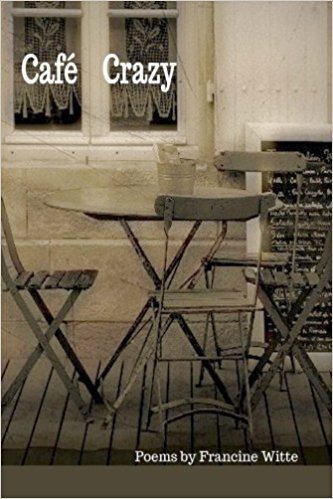 Café Crazy by Francine Witte
Café Crazy by Francine Witte
Kelsay Books, 2018
76 pages
$14.00 on Amazon
Wouldn’t you feel at home if you could walk into a cafe, sit at the counter and the waitress, “doesn’t bother with a menu. She knows exactly what (you’ll) have,” like in the poem “Café Crazy,” the last piece in Francine Witte’s new collection? Witte like the waitress in the poem has the gift of being able to read people, the ability to shape her findings into meaningful character sketches that are both intimate and ubiquitous. Witte, like the waitress in her poem, seems to know what a person needs before they even open their mouths to speak. Many of the pieces in this collection, especially the Charley poems, explore the complexity of the narrator’s romantic relationships. Her work is often candid and raw. In “Poem Where Charley Gets It in the Gut,” the narrator takes into consideration what her significant other might be thinking while they are dining out.
Yes, Charley, it hurts, this admitting you’re no
longer young, but let’s face it, now you are
even with the rest of us. Yeah, your boybrain
still tricks you into thinking you could fuck
the waitress if it weren’t for me. You do
the lustmath in your head–you, minus me,
equals the life you really want–
madcap and motorcycle dangerous all at
the same time. I can almost hear you
Whether it is the narrator’s own fears or her ability to sense the distance growing between herself and Charley, she is able to put into words the complexity of their relationship in a way that is relatable to the reader. Witte aptly captures the interactions that occur between lovers in the day to day. In “Tomato Scream,” Witte explains what is meant by what is said:
when Charley gets metaphorical,
it’s time to hide the wine.
Yesterday, it was the roof sag
and how do you expect a bunch
of shingles to hold up
all that snow? What he meant
was–how can I ever match
your expectations? Funny. I thought
While this is again an intimate poetic portrait, it is one easily recognized. Who hasn’t taken the words of a lover and twisted them in an effort to figure out what is happening in their relationship? Who hasn’t made that sagging roof out to be a warning that their love is about to cave in on them? In another poem, “Divorce on Mars,” which is overtly universal, Witte pontificates how divorce would be easier if it occurred on the fourth planet from the sun.
… Divorce on Mars is a clean
thing, unpeopled as it is. No well-meaning
neighbors to tell you how much better off you are.
And best of all, divorce on Mars has
a whole, clear view of the earth, small
as a marble you could pinch in your fingers,
rather than now, spread out like it is,
in a million different directions,
all of them going nowhere.
She has the ability to zoom in and zoom out, showing minute details or a broader picture of the world we live in. Not only does she explore romantic relationships, she also touches upon relationships with family and friends. All of the poems are terrific, but my personal favorite is one written to those unborn, “In My Poems, Sometimes I Have Children.” And as the poem’s title suggests, she writes about children she didn’t have, the daughter, who would be easier to relate to, and the “pretend son,” who, “wouldn’t be so generous.”
He would say he’s a lie I tell
myself to feel better about what
I haven’t done. I would laugh at him.
Pretend mothers can do that.
Then I would sit him down
and tell him my poems aren’t lies at all.
They’re just the truths that didn’t happen.
Maybe the overarching theme involves regret because sometimes that is what we end our days with. Whatever direction we take, you can find a poem, and Witte shows us just that, how a conversation about a roof sagging under the weight of snow can become a poem. Regardless of themes perceived, this collection is one that explores the human experience in a way that is both personal and universal.





